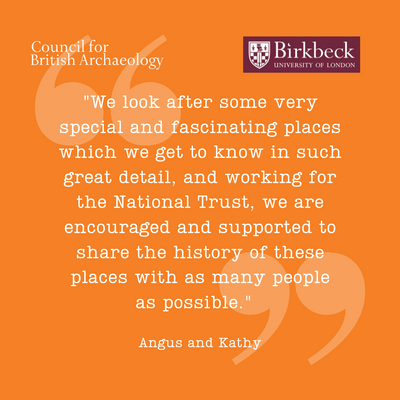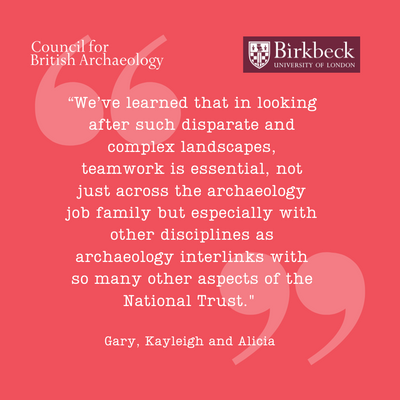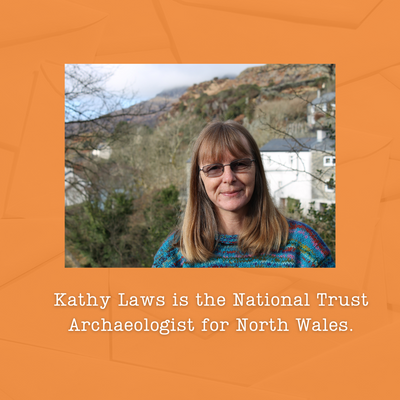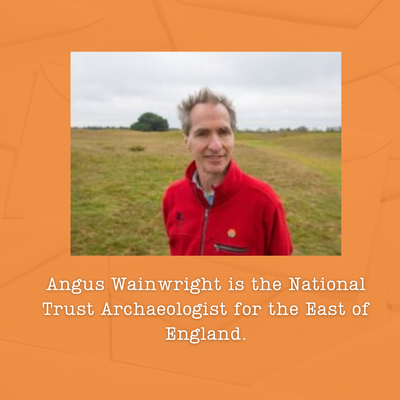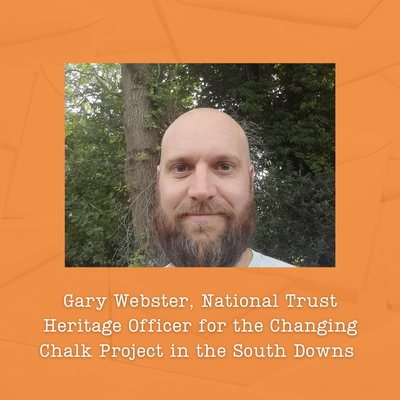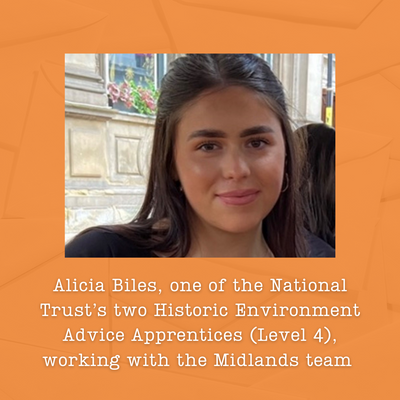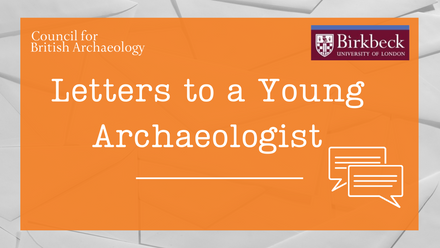Letter to a Young Archaeologist August 2023
This month, two of the National Trust's longest serving archaeologists, Kathy Young and Angus Wainwright, write to our Young Archaeologists about working for the National Trust, with additional responses from early career archaeologists, Gary Webster, Kayleigh Hibberd, and Alicia Biles.
Dear Young Archaeologist,
The National Trust is an organisation that cares for places for everyone, forever which means we spend a lot of time thinking about the past, and the future. Some of our longest serving archaeologists wrote about working for the National Trust and what they might want to share with the next generation of National Trust archaeologists, and some of our early career archaeologists also responded.
Angus Wainwright (National Trust Archaeologist since 1989) and Kathy Laws (National Trust Archaeologist since 2010)
One strange thing about being a National Trust archaeologist is that we don’t often work with other archaeologists. However, we do get to work with all sorts of other National Trust people: experts in nature conservation, land management, and gardens; building surveyors, property curators, conservators and managers; communications, engagement and marketing people. Generating enthusiasm in these other disciplines and learning more about their fields is one of the most rewarding things about being a National Trust archaeologist.
It’s fair to say we do less excavation than people imagine archaeologists would do. Working with other disciplines both within and outside the Trust, we focus a great deal on researching our places and how we can best look after them and share what is special about them. As the biggest landowner in the UK, there is always more to learn about the archaeological and historical narratives of our places.
Over time, archaeology in the National Trust has become more outward facing. Years ago, it was seen as unusual when our archaeologists started leading guided walks and putting on small exhibitions to talk about their research. With the growth and influence of the CBA’s Festival of Archaeology and the NT’s focus on our Everyone Welcome ambition, the role of the archaeologists has shifted to engage more people with our work and research.
A big challenge is the endless potential to find out more about our past - we could probably all each spend the rest of our lives studying the archaeology of just one of our hundreds of properties! Balancing the demands of the role to provide archaeological information to help inform land management and landscape changes, whilst continuing to make progress with important research can be challenging. As a charity with wide ranging responsibilities, resources can be very tight; we often need creative solutions to continue studying and sharing the hidden histories of our places.
Despite any challenges, the opportunities are considerable. We look after some very special and fascinating places which we get to know in such great detail, and working for the National Trust, we are encouraged and supported to share the history of these places with as many people as possible.
As far as advice for new NT archaeologists? Take time to explore your own interests but stay curious about different areas of history and archaeology and about your fellow NT archaeologists – they all have a lot to offer. Stay enthusiastic and keep sharing that enthusiasm. Always try to think about the bigger picture in your work – how do other people see the places you help care for and what are the priorities to ensure you all protect and support these places? Remain open-minded, pragmatic and prepared to learn...and re-learn! Seize opportunities and find your own path through them.
Don’t forget we explore and reveal the lives of real people and different elements of human history can engage and inspire others – it’s not just the parts that we individually get excited by! It’s also wise to look forward - we can learn from the experiences of our ancestors and its archaeologists that help us to do so. And hopefully we are good ancestors - passing on better cared for and understood archaeological sites and places to those who come after us.
And try not to eat too many scones!
RESPONSE: Gary Webster (National Trust Changing Chalk Project Archaeologist since 2022); Kayleigh Hibberd (National Trust Archaeological Technician Apprentice since 2023); Alicia Biles (National Trust Heritage Apprentice since 2022)
The enthusiasm and wealth of knowledge of the archaeologists within the NT is clear, and hearing about their experiences working in archaeology over decades is inspiring – it’s really driven our own passions to pursue our archaeological careers. We’ve learned that in looking after such disparate and complex landscapes, teamwork is essential, not just across the archaeology job family but especially with other disciplines as archaeology interlinks with so many other aspects of the NT. And there is a passion and willingness across the Trust to work collaboratively to protect and enhance both the natural and historic environments. The team are required to work across disparate sites and landscapes and be adaptable in their approaches to protecting and enhancing our archaeological assets. Through sharing experiences and knowledge across the team as well as learning from colleagues across other disciplines in the Trust, they take a proactive approach to their own learning and personal development.
We have seen that while it will be the job of the NT archaeologists to make a decision to protect the physical heritage of a site, weighing in on matters concerning several different disciplines, they seem also like shepherds - bringing interested people and volunteers to the physical places, or the avenues of the thought, that can inform them, but also require their input and time. We have learned that building a good relationship with communities and interested groups can pay dividends, and curating these relationships is an important part of the role of an archaeologist with the NT.
The NT archaeologists see the value of archaeology in driving public engagement at properties and within our short time here, we have seen how powerful archaeology has been as an engagement tool – creating opportunities for different groups of people to learn and experience heritage. Having met or spent time with all of the NT archaeologists, you can see how much they enjoy and thrive in delivering public engagement and sharing their enthusiasm for the past. The more outward-facing nature of archaeology at NT allows the team to foster a sense of community and shared learning with a willing public. We hope that the Trust continues to support archaeology as a valuable engagement tool and to fully realise the benefits of archaeology in working with local communities and groups as well as those who may not otherwise have opportunities to learn about archaeology or even access the heritage of NT places. We can also see the important role of the NT archaeologists in educating people in the protection and management of heritage for the future whilst also offering chances for people to directly participate in research or monitoring of the 95,000 sites and monuments so far recorded across NT land.
We hope that archaeology at the NT continues to be more outward looking in spite of the challenges of resources and staff time, and that archaeology is considered in decision making, not just where it is at risk, but where it can play any part in enriching the journey through our places. We hope the NT continues to find new ways to engage the public through events such as the Festival of Archaeology, to enable people to learn more about our incredible heritage. The field of archaeology offers great opportunities for the National Trust to engage with different communities and inspire them to get involved with what we do. It is such a versatile learning tool and holds an important role within the National Trust as it allows us to tap into the rich history of our places through different means and approaches.

